Blumont employees and volunteers are working across the globe to aid communities facing ongoing crises. As World Humanitarian Day celebrates #WomenHumanitarians, we recognize our dedicated colleagues who help make the world a little better every day, one individual, family, and community at a time.
Leading by Example
By employing women in humanitarian aid leadership and on-the-ground roles, we have the opportunity to lead the way for both staff and beneficiaries. Annie Killefer, Blumont’s Humanitarian Assistance Technical Advisor, says this drives progress in the workplace and the world.
“We are trying to empower people who have lost everything,” Killefer said. “If we ourselves can reflect that in our own management structure, then we have a much better chance of actually getting the work done.”
Having women in leadership roles fosters a safe and inclusive work environment by both encouraging advancement and understanding and anticipating needs. An example in Killefer’s experience working with a previous organization illustrated this. When an all-women team was under-performing seemingly because of a lack of skill, Killefer said she discovered the women were walking an hour home and back during the day because the office bathrooms didn’t adhere to cultural norms.
“I knew to ask those questions because I am a woman,” Killefer said. “We constructed a latrine that was on the other side of the office … Literally within a month, they were exceeding their targets.”
Program participants also benefit from women humanitarians on the ground by improving cultural and gender sensitivities in service provision.
“The sole involvement of female staff [is sometimes required] to consider the cultural norms and traditional gender sensitivity which exists in targeted communities,” Ahin, one of our ‘humanitarian heroes,’ said. “This leads to incorporation of ‘do no harm’ principles and therefore maintaining community acceptance.”
Our women humanitarians have created a culture of support and empowerment and encourage each other to persist in their work.
“I hope you are knowing that you have a big responsibility,” Wijdan, another of our ‘humanitarian heroes,’ addressed her colleagues and other women in humanitarian aid. “A glass of water that you give kindly may have great meaning in the life of someone who has lost faith in humanity and you may restore trust in those around them. May you be that great person in your work and take their hands to realize their dream.”
Our Humanitarian Heroes
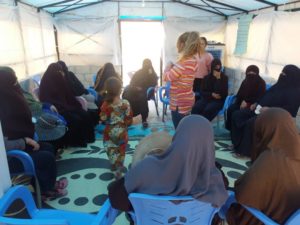
Ahin, Camp Technician Officer, Iraq
Ahin, a social worker at refugee camps in Syria, provides critical psychosocial support to vulnerable communities while engaging people in learning and recreation sessions. To Ahin, being a humanitarian means reaching the people who need her most, regardless of race, gender, religion, or sect.
“Through my direct interaction with beneficiaries, I’m sharing with them the necessary support and coping mechanisms for their needs,” Ahin said. “We listen to beneficiaries, let them offload their emotional burdens, respect their views, and encourage them to scout for their own positive living styles.”
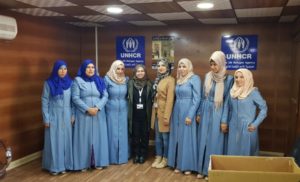
Chnoor, middle, Camp Manager in Iraq
As an Iraqi who has been personally affected by war and conflict, Chnoor uses her role as a camp manager to support displaced families while inspiring women with her leadership.
“We build a strong relationship and trust … and help them believe that a female camp manager can support them and their rights,” Chnoor said. “This encourages them to push their female family members to re-engage in school and have a role in the community besides their role as a housewife.”
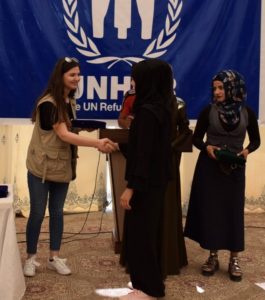
Hawzheen, left, Reporting Coordinator in Iraq
Hawzheen, a reporting coordinator in Iraq, works in camps for refugees and displaced persons to analyze data and identify opportunities to make projects more effective and efficient. Hawzheen says the team provides essential and lifesaving support for their beneficiaries.
“We receive and support them before anyone else,” Hawzheen said. “To work in the humanitarian sector, you have to be empathetic and you have to inspire people to not stay in their comfort zone while others need a helping hand.”
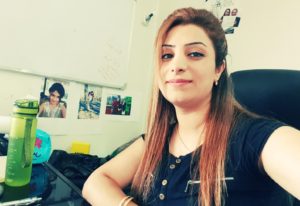
Hayastan, Senior Protection Officer, Syria
As a senior protection officer, Hayastan leads a team of 27 staff and 35 volunteers to assist, protect, and empower displaced persons and asylum seekers in Syrian camps. As she and her team connect beneficiaries to services, reunite families, and improve camp conditions, Hayastan says the crux of humanitarian work is using her skills to help stigmatized and displaced people find comfort.
“Humans are born with innate love to help others,” Hayastan said. “To wipe the tears of women who have suffered, to bring a smile to the face of a tired child, to help youth believe in themselves means that you are a part of those who are seeking the change we want to see in the world. It is the best part of my job.”
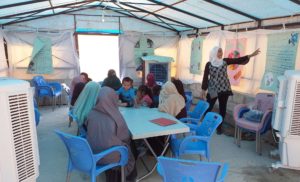
Nawroz, right, Nurse in Syria
Nawroz works as a nurse both in and out of camp settings in Syria, providing care and health education to women and children to improve overall health and nutrition. Nawroz has seen the relief in peoples’ faces when they realize there is a health team to support them after crisis, conflict, and disasters.
“Every human has the right to live with dignity, access to assistance, and protection, including healthcare,” Nawroz said. “We are humanitarians, so we need to do what we can to assist.”
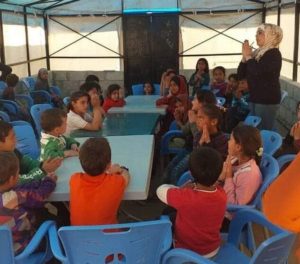
Rawshan, right, Psychologist and Protection Team Leader in Syria
Psychologist and Protection Team Leader Rawshan helps people, especially women and children, transition from conflict and adapt to life in Syrian camps. The psychosocial support and awareness sessions she provides are reducing stress, expanding social networks, and empowering beneficiaries with life skills, including parenting support.
“What attracted me to work in the humanitarian sector is my study in the field of psychology,” Rawshan said. “The crisis in Syria was an opportunity for me to enter the humanitarian sector and provide services to vulnerable people in a purposeful and orderly manner.
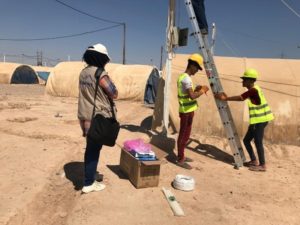
Remah, left, Camp Technician Officer in Iraq
Remah, a camp technician officer in Iraq, works directly with displaced people in camp settings. She focuses on empowering marginalized people, such as urging families to send their daughters to secondary education, supporting women’s committees to learn and teach handicrafts, and listening to problems and finding solutions.
“Humanitarian work is watering the plant to regenerate and bloom again,” Remah said. “It is the light which can illuminate the way for many people.”
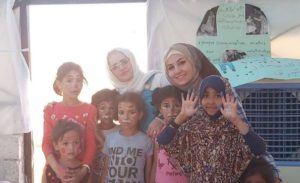
Wijdan, Psychologist, Syria
Wijdan, a psychologist in Syria working with women and children who suffered violence by terrorist groups, draws from her personal experience with conflict and displacement to help as many people as possible.
“[Being displaced due to conflict] is indescribable—you feel that you don’t have any value, that life is cruel, and no one is with you,” Wijdan said. “My work in the humanitarian sector is an opportunity for me to help, as much as possible, people who have had the same experience. It is my opportunity to let them know that I am with them and I am supporting them, and that they are not alone.”
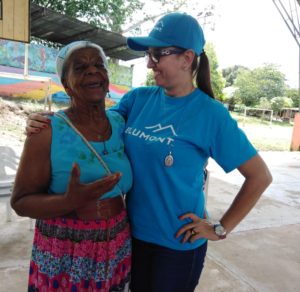
Claudia, right, Regional Coordinator in Colombia
Claudia, a regional coordinator in Colombia, leads a team of 16 people to alleviate the suffering of victims of armed conflict. Working closely with individuals and communities, as well as government officials and partners, Claudia says the relief she and her team provides strengthens services but also individuals, leaders, and communities.
“I feel that I am part of the possibilities available to victims of armed conflict in my country and in my region, for them to overcome their fears and the obstacles they face,” Claudia said. “Every day I make an effort to give my best for them with a team that alleviates the suffering of victims with passion and dedication.”
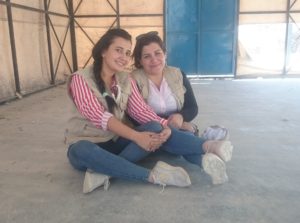
Maya, left, Site Engineer in Syria
Maya works as a site engineer in camp settings in Syria to bring essential services like water, sanitation, and electricity to displaced persons. In seeing beneficiaries transition from conflict to security, Maya says the work of a humanitarian means counteracting wars, conflict, hunger, and tears by building a better life for those who need it most.
“If humans are the reason for war and destruction, then we should also be the cure,” Maya said. “We have to be part of joy, smiles, futures, education, and hope.”
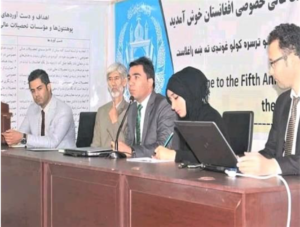
Najwa, second from right, Data Management and Program Officer in Afghanistan
For Najwa, a data management and program officer in Afghanistan, being a humanitarian means helping people, especially women, understand their rights, creating opportunities, and empowering them even amid gender discrimination. Najwa uses her personal experience with negative stereotypes to put power behind her work.
“I have heard men saying that women … cannot participate in the development of a society owing to their gender and disposition,” Najwa said. “But I have proven them wrong because I am a resilient Afghan. If I fall, I will rise again even more strongly.”
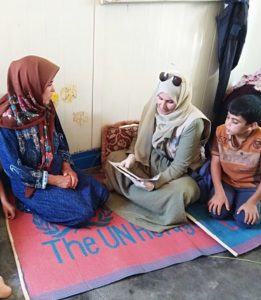
Aysha, middle, Syrian Volunteer in Jordan
As a Syrian Volunteer, Aysha identifies, assists, and supports vulnerable cases in Jordan’s Za’atari Camp. Her work supports self-development and motivates beneficiaries to reach their goals, and Aysha says she sees positive impact through the love beneficiaries show during her visits with them.
“[Being a humanitarian] reflects a positive image of self,” Aysha said. “The pursuit of self-development, including charitable work, supports and helps to refine the personality of women no matter how harsh the environment.”
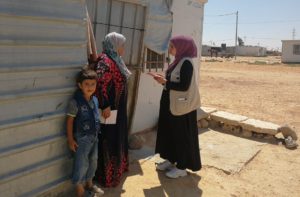
Manal, right, Social Worker in Jordan
Manal, a social worker in Jordan’s Za’atari Camp, supports and empowers vulnerable refugees by engaging them in courses, training, and awareness sessions to meet their needs and grow their skills. Fostering personal development for beneficiaries and instilling trust in her work, Manal says their progress is essential to her mandate as a humanitarian.
“Helping people, providing moral support, and always trying to make them happy with themselves is what motivates me,” Manal said. “Humanitarian work is a unique experience that gives women maturity and makes lives meaningful by supporting others and helping them reach their goals.”



